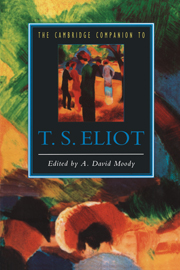Book contents
- Frontmatter
- 1 Where is the real T. S. Eliot? or, The Life of the Poet
- 2 Eliot as a product of America
- 3 Eliot as philosopher
- 4 T. S. Eliot's critical program
- 5 The social critic and his discontents
- 6 Religion, literature, and society in the work of T. S. Eliot
- 7 “England and nowhere”
- 8 Early poems
- 9 Improper desire
- 10 Ash-Wednesday
- 11 Four Quartets
- 12 Pereira and after
- 13 “Mature poets steal”
- 14 Eliot's impact on twentieth-century Anglo-American poetry
- 15 Tradition and T. S. Eliot
- 16 Eliot
- 17 Eliot studies
- A Select Booklist
- Index
10 - Ash-Wednesday
a poetry of verification
Published online by Cambridge University Press: 28 May 2006
- Frontmatter
- 1 Where is the real T. S. Eliot? or, The Life of the Poet
- 2 Eliot as a product of America
- 3 Eliot as philosopher
- 4 T. S. Eliot's critical program
- 5 The social critic and his discontents
- 6 Religion, literature, and society in the work of T. S. Eliot
- 7 “England and nowhere”
- 8 Early poems
- 9 Improper desire
- 10 Ash-Wednesday
- 11 Four Quartets
- 12 Pereira and after
- 13 “Mature poets steal”
- 14 Eliot's impact on twentieth-century Anglo-American poetry
- 15 Tradition and T. S. Eliot
- 16 Eliot
- 17 Eliot studies
- A Select Booklist
- Index
Summary
While Eliot's prose writings between 1925 and 1945 expound the need for self-transcendence, his poetry can be said to display the difficulties involved in this process. As early as 1916, in his dissertation on Knowledge and Experience in the Philosophy of F. H. Bradley, he had made it clear that by “self-transcendence” he meant, paradoxically, the struggle to progress from a purely personal experience of contact with the noumenal, the realm that is beyond phenomena and outside the process of time, by entering more fully into the shared world of objects and of time; and by multiplying experiences to pursue the ideal “of an all-inclusive experience outside of which nothing shall fall” (KE p. 31). The assumption is that the more comprehensive our experience, and the more unified our knowledge derived from experience, the nearer we come to the total truth.
It is the limited scope of merely private experience that compels us to go out of ourselves, out of even our most intense and timeless moments, into the common world of others and of passing events. No individual can be self-sufficient, “for the life of a soul does not consist in the contemplation of one consistent world but in the painful task of unifying (to a greater or lesser extent) jarring and incompatible ones” (KE p. 147). But to “unify” is to incorporate and to transmute, to make what was other our own, and so to get free again of the world of timebound phenomena. The vital difference between the beginning and the end of this process is that what was at first simply one's private experience comes to be confirmed and verified, and established as impersonal and absolute truth.
- Type
- Chapter
- Information
- The Cambridge Companion to T. S. Eliot , pp. 132 - 141Publisher: Cambridge University PressPrint publication year: 1994
- 1
- Cited by



